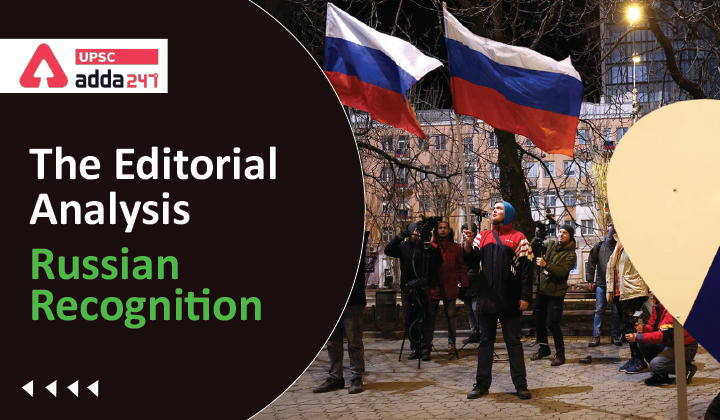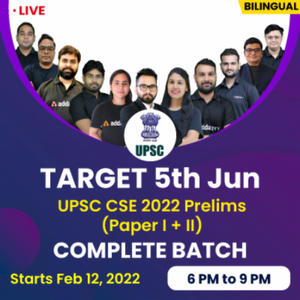Table of Contents
Russian Recognition of Ukrainian Territory- Relevance for UPSC Exam
- GS Paper 2: International Relations- Effect of policies and politics of developed and developing countries on India’s interests.
Russian Recognition of Ukrainian Territory- Context
- Recently, Russian President Vladimir Putin has announced a formal recognition for the Donbas region enclaves (Oblasts) of Donetsk and Luhansk in Eastern Ukraine.
- This changes the course of the present diplomatic efforts among European Countries and Russia.
इस लेख को हिंदी में पढ़ने के लिए यहां क्लिक करें।
What does it mean in the Present Russia-Ukraine Tensions?
- Violation of Minsk Accords: Russian recognition of the two separatist groups that control parts of the Donbas region as governments signals that Russia is no longer interested in talks on the basis of the “Minsk accords”.
- The Minsk agreements — negotiated in 2014 and 2015, but never fully implemented — had secured a “special status” for the Donbas enclaves.
- Russian Troops on the Ground: Russia has also ordered Russian “peacekeepers” into the region, a move that could spark off conflict with Ukrainian troops.
- Russia claims that it is far short of the “invasion” that the U.S. and its NATO allies have been warning about, and should not incur any further hostilities from Ukraine.
- Threat of War persists: The presence of Russian forces on the Ukrainian Soil means that the threat of conflict would persist even when the Russian troops along the Ukraine border, and in Belarus for military exercises, withdrew.
- NATO’s Imminent Role: The situation is not going to be “managed” or “handled” without NATO sitting down to serious negotiation over the security guarantees that Russia has been demanding for two decades.
- Some discussion with NATO about how to regulate the expansion of NATO to Russia’s neighbouring countries and the heavy presence of western troops and weapons in the region is also required.
- Dilemma for the USA and other European powers: the U.S. and its European allies have to decide whether they would react with sanctions, military action, or return to the diplomatic table.
- Impact on Indian Interests: Indian Foreign Minister is in Europe. He has tried to shift the focus of his European interlocutors to the Indo-Pacific, it is Russia’s actions that dominate the conversation.
- In addition, Pakistan Prime Minister is visiting Moscow, the first by a Pakistani PM in over two decades, and New Delhi is watching the new ties closely.
- Delivery of Russian S-400 Missile Systems: The timing of the tensions is all the more inconvenient, given that the delivery of Russian S-400 missile systems is underway.
- S. administration is still to decide on whether to waive or impose CAATSA sanctions against India.
India’s stand on Russia-Ukraine Conflict
Russia-Ukraine Conflict
- India at the UNSC appealed for diplomacy and de-escalation while making no critical comment about Mr. Putin’s announcement.
- It is not just an assertion of India’s traditional principled position, or a study in pragmatism but also a reflection of the difficult position New Delhi finds itself in over the conflict, which appears to have now entered a new phase.
Minsk Agreements and the Russia-Ukraine Conflict





 TSPSC Group 1 Question Paper 2024, Downl...
TSPSC Group 1 Question Paper 2024, Downl...
 TSPSC Group 1 Answer key 2024 Out, Downl...
TSPSC Group 1 Answer key 2024 Out, Downl...
 UPSC Prelims 2024 Question Paper, Downlo...
UPSC Prelims 2024 Question Paper, Downlo...
